Thirty years ago, the ill-conceived comedy Heil Honey I’m Home! was cancelled by its UK broadcaster after only one episode. Laura Martin talks to those involved.
L
Last year, at New York’s Museum of the Moving Image, comedy writer Geoff Atkinson was interviewed as part of its No Joke: Absurd Comedy as Political Reality series. Atkinson – who has spent his career writing for some of British TV’s most celebrated comedy shows, from the Two Ronnies to Spitting Image and Bremner, Bird and Fortune – was there to discuss just one production: a pilot for a sitcom that was broadcast, once, on an obscure British satellite channel, 30 years ago.
More like this:
– The power of the conspiracy thriller
– Ratched review: a ‘blackly comic melodrama’
– Why we no longer need superheroes
“It’s the one series that has never been aired in full, but I get asked about it, even now, more than any other TV show,” Atkinson tells BBC Culture. “Everybody has an opinion on it.” It’s hardly surprising given what that show is: a sitcom about Adolf Hitler’s domestic life entitled Heil Honey, I’m Home!
From the gasp-inducing title, part-spelled out in the official Nazi font, Fraktur, (“the name was conceived of as that, and always remained as that,” Atkinson explains) to the actual concept – a jolly Adolf Hitler and Eva Braun clash with their Jewish next door neighbours in a stylised parody of 1950s US sitcoms – the show was bound to cause controversy. And so it did, when it appeared on the programme line-up of the British Satellite Broadcasting (BSB) network. Among those who denounced it was Britain’s biggest Jewish organisation, the Board of Deputies of British Jews. “We are against any trivialisation of the Second World War, Hitler or the Holocaust,” a spokesperson said, “and this certainly trivialises those things. It’s very distasteful”.
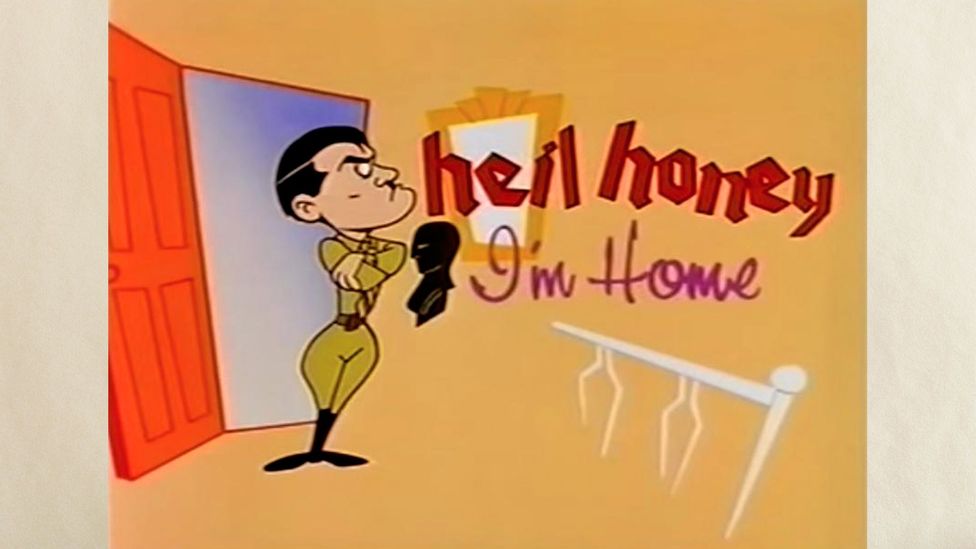
From the animated title sequence onwards, the ill-fated Heil Honey I’m Home! was always bound to cause controversy (Credit: Sky)
The show was swiftly cancelled after one episode, leaving it as a strange footnote in TV history, that subsequently found itself branded “perhaps the world’s most tasteless situation comedy”. These days, it has reached a level of infamy that means it is still regularly discussed in incredulous terms on retrospective programmes like The 100 Greatest TV Moments From Hell (it came in at number 61, if you were curious).
The genesis of a disaster
“I’m playing around with an idea of sitcom with Hitler in it,” Atkinson first told commissioners from independent production company Noel Gay TV at the end of a media lunch in 1989. “They all looked quite interested,” he says of its inception. “From there to the commission was quite simple – there were questions about what it was and what it was trying to do, but it wasn’t difficult. It had a sort of charmed life at that point.” It was set in Berlin in the pre-war times, explains Atkinson, “when we [in the West] knew what Hitler was doing, but contained him – we were blind to the horrors.
“My thinking was, how do you deal with a bully? There’s an argument that it’s equally good to destroy him once and for all by turning him into a joke, and who better to do that than the Jewish couple next door? That was the simple driving force.”
In this strange set-up, Hitler (played by Neil McCaul, with a broad New York accent) occupies the stereotypical man-of-the-house role of sitcomland. That is, brash, hapless, and prone to sparring with his long-suffering wife – only with a slightly different agenda than usual, that of invading Poland with his fascist troops. His hammed-up exasperation is generally exacerbated by those around him – especially his next door neighbours, The Goldensteins.
In the pilot, which is still available on YouTube, the Jewishness of the Goldensteins is never really addressed – or rather it is never made clear whether the Hitler character is aware of their identity. Instead they’re portrayed merely as an annoyance to him. Hitler doesn’t want the couple ruining his evening with British Prime Minister Neville Chamberlain, with whom he is signing the Munich Agreement, but they crash the party, get drunk on schnapps and end up doing the conga.
Actor Caroline Gruber, who played Rosa Goldenstein, was at the time performing on a live topical comedy programme, Up Your News. “Initially they wanted me to play Eva Braun, but I said ‘I don’t want to play her because I’m Jewish, I want to play Rosa’. They said ‘But you don’t look Jewish?’. I replied: ‘Well, I may not look it but I have 2,000 years of persecution running through my veins’. I really liked the premise but it was important to me that they got Jewish actors to play the Jewish couple.”
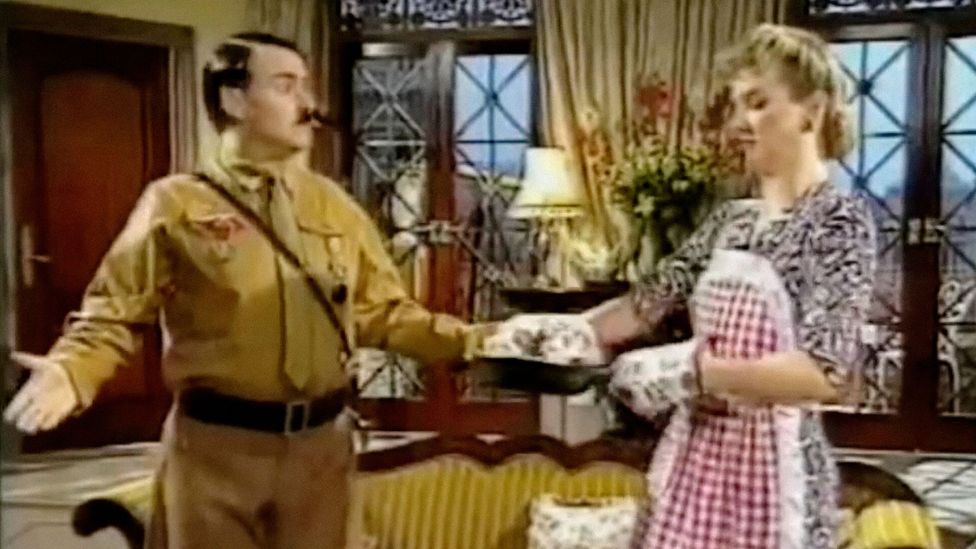
The premise of Heil Honey I’m Home! saw Hitler and Eva Braun clash with their Jewish next door neighbours in a stylised parody of 1950s US sitcoms (Credit: Sky)
When her co-star Gareth Marks first got a call about the show, producers wanted him for Hitler, but, Jewish as he is also, he pushed instead for the part of Arny Goldenstein. He went to his dad, the late, celebrated comedy actor Alfred Marks, for advice. “He’s a good judge of things, and I said, ‘Listen, is this going too far?’ He convinced me that I was doing the right thing, I took his word, and I’m glad I did.” Gruber also looked to her family as a testing point for how it might be received: “I’m not remotely religious but I come from a fairly observant family and my father came to the filming, and he thought it was one of the funniest things he’d ever seen.”
Both Gruber and Marks had appeared in controversial shows prior to this, though on stage: Marks played King Herod in Andrew Lloyd-Webber and Tim Rice’s musical Jesus Christ Superstar in the 1980 UK tour (“people picketed the show outside, saying: ‘This is terrible! How dare you make Jesus into a musical!'”) while in 1987 Gruber starred in Perdition, a play directed by filmmaker Ken Loach at the Royal Court Theatre which was cancelled 36 hours before curtain up amid protests alleging it was anti-Semitic and could incite racial hatred.
“Because of this experience, I was sensitive about doing anything that was offensive or upsetting,” Gruber says. “I didn’t think Heil Honey was either – I thought it was so funny. When I was reading through the scripts for the other episodes that Geoff had written, I couldn’t get through them, I had tears pouring down my cheeks. I was of the opinion – and still am now – that within reason, people should take risks. If it’s funny, if it works, it’s OK.”
What happened behind the scenes
Once filming was underway in May 1990, the media scrutiny started. “The Jewish Chronicle called me up and they asked me for an interview,” Marks says. “They were up in arms about it, but I said, ‘You haven’t seen it yet as it hasn’t been screened. We’re not praising Hitler, we’re ridiculing him’. There was a little bit of fallout from that article, but the rest of it we were shielded from.”
When the pilot screened on BSB’s Galaxy channel on 30 September 1990, it was to a limited audience of “probably a few thousand people”, says Atkinson. Most of the outcry came from the announcement of the show earlier in the year, rather than from people who actually watched it when it aired. However, news of its controversial theme made it over to the US: after viewing the pilot, the LA Times asked: “Is this dangerous?”
Subsequently, the show was shaken up, with the actress playing Eva Braun, Denica Fairman, replaced for the full series by Maria Friedman and a new American showrunner/writer brought in to oversee Atkinson and amend his script.
“The pilot and the series were two different things,” says Gruber, of the other seven episodes that were filmed, but never aired. “By the time it came to do the series they were very nervous about it. We had an episode of Hitler building shelves, for instance. The series was much safer and they played down the Jewish couple – I think the new showrunner would have been happy if they weren’t in it at all.”
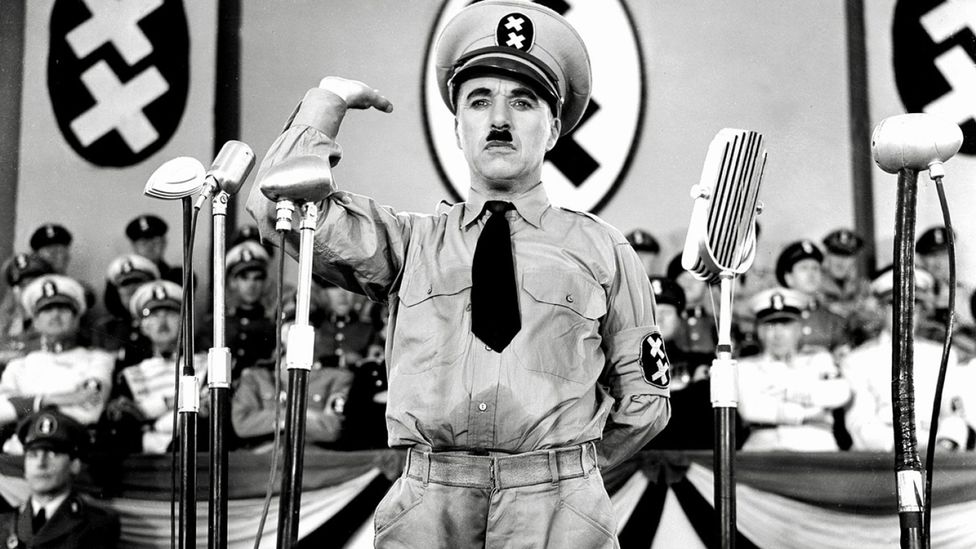
The history of comic representations of Hitler stretches back to 1940’s The Great Dictator, starring Charlie Chaplin as thinly-veiled Fuhrer figure Adenoid Hynke (Credit: Alamy)
“The guy they brought in to be a gag writer just didn’t get the concept at all and had a totally different approach to Atkinson’s comedy and the script,” adds Marks. “He told me: ‘I’ve been getting death threats in Hollywood about this’. ‘No you haven’t, you liar, I thought. Because it’s not even come out yet.'” Atkinson made it to the filming of the “fourth or fifth episode” of the series before he relinquished control of his project: “I was still around, but I stepped back,” he says.
The whole production was shut down a few weeks later, halfway through filming the first series of 16 episodes, not as a result of any outcry of offence, as often presumed, but because of the takeover of BSB by Rupert Murdoch’s Sky Television in November 1990. The cast and crew’s contracts were retired and Sky made “a commercial decision” to focus on US-based comedies rather than controversial home-grown shows. “They broke up the rehearsal to announce it to us. It was a real knife wound,” remembers Marks.
Despite McCaul telling BBC Culture that he no longer gets involved with discussions on the show as he was “badly burned” in the past, both Gruber and Marks say being attached to the sitcom didn’t have an adverse effect on their careers. “Not in the slightest,” says Marks. “Nobody ever mentioned it in auditions.” “If they saw it on my CV they might ask about it, but it didn’t affect my career at all. I think it was because so few people actually saw it,” says Gruber.
As for the show, does it deserve its reputation as one of the most offensive TV sitcoms of all time? Leon Hunt, senior lecturer in film and TV studies at Brunel University, thinks not. Of the pilot, he says: “I think people would find it less offensive watching it in 2020. I don’t think offence would be the problem, I think people just wouldn’t find it very funny.
He also points out that Hitler as a comedy figure has been a staple in light entertainment, ever since Charlie Chaplin donned a toothbrush moustache in the 1940 satire The Great Dictator. “Hitler as a comedy figure is a well-established comedy trope. But it has to be Hitler as a grotesque figure, with the shouting and the silly moustache. You also have to separate certain aspects of Hitler from the past that are hard to joke about.”
The challenge of depicting Hitler in comedy
Judging by the pilot, this is the key way in which Heil Honey I’m Home! fell down – parody or not, placing Hitler in a US-style family sitcom format rendered him jarringly ‘everyman’ and borderline affable. Having him declare himself a “very, very bad Hitler” and slap himself on the wrists for being late for Eva’s special schnitzel dinner serves to defang him in a way that seems morally suspect from the off. What’s more, the referencing of historical events like Chamberlain’s 1938 visit and the Munich Agreement only makes the anodyne tenor of the thing even more bizarrely inappropriate.
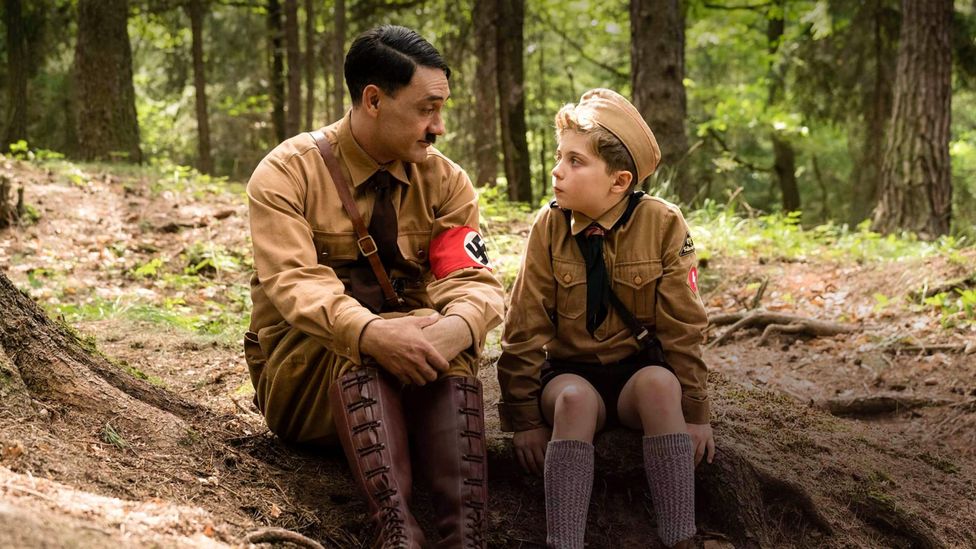
Taika Waititi’s 2019 film JoJo Rabbit saw the director himself play Hitler as a child’s imaginary friend (Credit: Alamy)
In a way, it recalls the problems that befell a much-more lauded production: Taika Waititi’s 2019 family film, Jojo Rabbit, in which Hitler appeared as an imaginary friend to Jojo, a young member of the Nazi Youth. Like Heil Honey I’m Home!, it was a work that framed Hitler within a weirdly middle-of-the-road genre – in its case, a cutesy coming-of-age film – that made the whole thing tasteless, paradoxically, in its tastefulness. “There is something weirdly redundant about it. Jojo Rabbit fails to attack or even really notice evil,” as The Guardian’s Peter Bradshaw commented.
Perhaps the most celebrated comic depiction of the Fuhrer remains Mel Brooks’ 1967 film The Producers – later a Tony-award winning musical – in which two con-men aim to make the worst musical theatre show in history as part of exploiting a tax loophole. Their concept: Springtime for Hitler, an extravaganza which features a camp, tap-dancing Hitler, goose-stepping dancers and a chorus line that creates a giant swastika formation. Watching the pilot of Heil Honey I’m Home! now, you can’t help but be reminded of The Producers, but as Hunt explains, that’s not a comparison which flatters: “With The Producers, it’s a show within a film. It’s not the whole film. That’s where Heil Honey fails – they’ve essentially made a sitcom of Springtime for Hitler. It should be a sketch, rather than an eight episode series, as the joke runs out of steam after five minutes.”
Interestingly, though, Atkinson did give Heil Honey I’m Home! a similar show-within-a-show meta-framing: a blink-and-you’ll miss it gag in the opening caption cards suggests the audience is watching the ‘lost tapes’ of a series created by fictional TV exec Brandon Thalburg Jr and “found in a Burbank backlot”. Reflecting on it now, Atkinson says they could have made much more of this aspect using a mockumentary-type format: “At one point we toyed with the idea of it being a making-of Heil Honey I’m Home!, which allowed the actors to talk about playing the characters. They could say, ‘I’m not comfortable with that line’ or ‘that’s not true’, but it sort of took the sting out of it. I felt at the time it was better to go for the pure form, just the sitcom.”
This more deconstructed form of comedy, by flagging up the potential offensiveness of the premise, ironically might have made the whole thing less offensive. “Often in comedy there’s kind of a contract about what the expectations are, there’s an unwritten agreement about what we can joke about and how we understand those jokes,” as Hunt says. “It’s [also] a lot about setting,” he adds. “For example, there are jokes being told every night in comedy clubs that the tabloids would explode about if they got into the press; every line is being crossed, and that’s harder to manage on TV. It’s why TV comedies tend to be more controversial than any other kind of comedy, because it’s where there’s the greatest potential to stumble across something and be offended by it.”
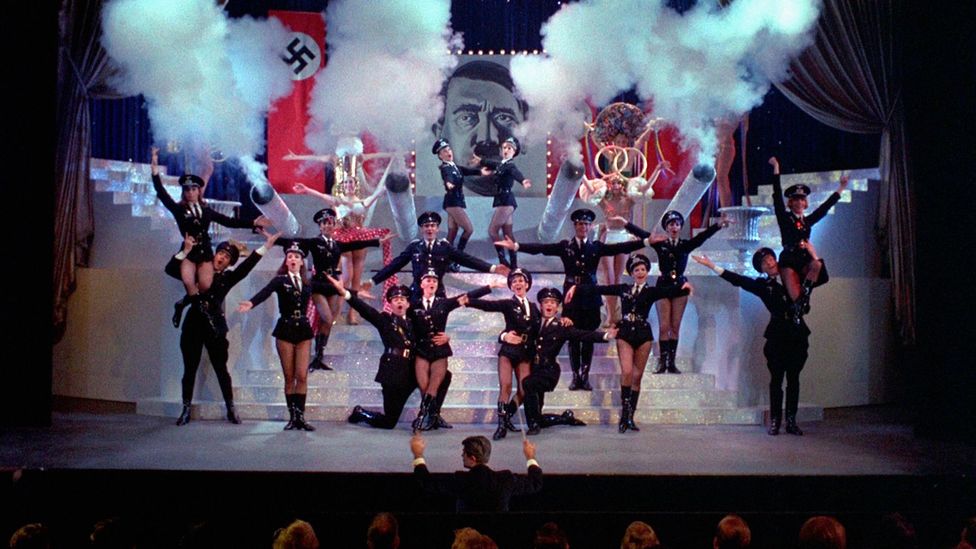
The Producers’ show-within-a-show Springtime for Hitler remains perhaps the most famous example of ‘Hitler comedy’ (Credit: Alamy)
On the lasting infamy of his cancelled show, Atkinson is sanguine. “The worst thing to do about it is scream ‘unfair’,” he says. “You want an audience to react badly and then to be won round by it, which didn’t happen. I wish we had got it right – there’s a slight sense of regret that it appears in the 50 worst TV shows of all time, not the 50 best. But, you’ve got to move on.”
Meanwhile Gruber remains equally unruffled by this entry on her CV. She even showed it to her 23-year-old son recently: “He said, ‘Turn it off mum, it’s really not funny.’ I guess I saw it through his eyes and it wasn’t that funny either.
“All the sensationalism about it at the time, I think it was misplaced, they were overreactions,” she adds. “It was a conceit, it wasn’t meant to be taken literally. The irony was the whole [lost tapes] premise; it was a sitcom that had been shelved, but weirdly, that’s exactly what ended up happening in real life.”
Love film and TV? Join BBC Culture Film and TV Club on Facebook, a community for cinephiles all over the world.
If you would like to comment on this story or anything else you have seen on BBC Culture, head over to our Facebook page or message us on Twitter.


